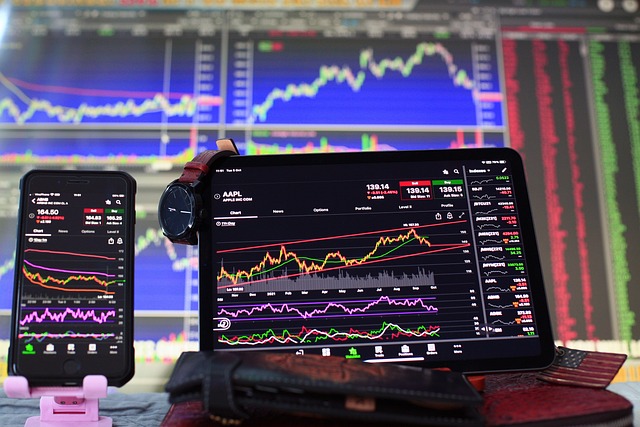AI Crypto Trading: Revolutionizing the Financial Landscape
Author: Jameson Richman Expert
Published On: 2024-08-20
Prepared by Jameson Richman and our team of experts with over a decade of experience in cryptocurrency and digital asset analysis. Learn more about us.
In recent years, the financial world has witnessed a seismic shift in trading methodologies, particularly with the emergence of cryptocurrencies. Coupled with advancements in artificial intelligence (AI), this shift has led to the rise of AI-driven crypto trading. In this article, we will explore the intricacies of AI in cryptocurrency trading, diving deep into its functionalities, advantages, challenges, and the future it holds for traders and investors alike.

Understanding the Basics of AI in Crypto Trading
To appreciate the impact of AI on crypto trading, it is essential to understand what these terms mean. Cryptocurrency trading involves buying and selling digital currencies through exchanges, typically for profit. AI, on the other hand, refers to the simulation of human intelligence in machines programmed to think and learn like humans. The fusion of these two concepts leads to the development of sophisticated trading bots that analyze market trends and execute trades without human intervention.
How AI Works in Crypto Trading
AI crypto trading strategies rely on algorithms that process vast amounts of data to make informed decisions. Here’s a breakdown of how this works:
- Data Collection: AI systems gather historical price data, trading volumes, market sentiment through social media, news articles, and other relevant information.
- Data Analysis: The algorithms utilize machine learning techniques to identify patterns and correlations in the data, making predictions about future price movements.
- Algorithmic Trading: Based on the insights gained from data analysis, the AI bot can execute trades automatically, buying or selling cryptocurrencies based on predefined criteria.
- Continuous Learning: One of the most appealing features of AI is its ability to learn and adapt. AI algorithms can refine their strategies over time as they encounter new data and market conditions, enhancing their trading performance.
Types of AI Techniques Used in Crypto Trading
There are several AI techniques employed in crypto trading, each with its unique methodology:
- Machine Learning: This involves training algorithms on historical data to make predictions about future price movements. Various models, such as regression analysis and neural networks, are commonly used.
- Natural Language Processing (NLP): NLP helps analyze news articles and social media feeds to gauge market sentiment. Understanding public sentiment can provide insights into potential market movements.
- Reinforcement Learning: This technique encourages machines to learn from their actions by rewarding or penalizing them based on the outcomes of their trades, allowing them to optimize their strategies over time.
Advantages of AI Crypto Trading
The integration of AI in crypto trading offers numerous advantages, some of which are game-changing in the investment landscape:
1. Speed and Efficiency
AI can analyze data and execute trades in milliseconds, far surpassing human capabilities. In cryptocurrency trading, where volatility is rampant, speed can be the deciding factor between profit and loss. I believe this rapid execution not only enhances trading opportunities but allows traders to stay ahead of the curve.
2. Emotions Are Eliminated
Human traders often fall prey to emotional decision-making, leading to significant mistakes in trading. AI systems, being devoid of emotions, make decisions strictly based on data and algorithms. This objectivity can result in more rational trading strategies, effectively mitigating risks associated with impulsive decisions.
3. Enhanced Predictive Analytics
AI’s data analysis capabilities can uncover patterns and trends in vast datasets, enhancing the accuracy of predictions. From my perspective, this level of insight can empower traders to make well-informed decisions, optimizing their portfolios significantly.
4. Diversification Strategies
AI enables traders to efficiently manage multiple cryptocurrencies simultaneously. By analyzing various markets and deploying effective strategies across them, traders can achieve better diversification and reduce overall portfolio risk.
Challenges and Risks of AI in Crypto Trading
While the benefits of AI in crypto trading are compelling, there are notable challenges and risks that must be acknowledged:
1. Market Volatility
Cryptocurrencies are notoriously volatile, and AI models trained on historical data may not always predict future movements accurately. This unpredictability can lead to significant losses, even for AI systems. It's a sobering reminder that even the most advanced algorithms can falter in uncertain market conditions.
2. Dependence on Data Quality
AI systems rely heavily on the quality of data they process. Inaccurate or manipulated data can lead to misguided predictions. This vulnerability emphasizes the need for robust data sources and the importance of comprehensive data verification processes.
3. Technological Dependency
An over-reliance on AI can diminish a trader's capability to analyze and understand the market independently. While I see the potential in delegating tasks to AI, it is crucial for traders to maintain their analytical skills and market knowledge.
4. Regulatory Concerns
As the use of AI in trading grows, so do the regulatory challenges. Regulatory bodies are still grappling with how to manage AI-driven trading practices, which can introduce uncertainty and compliance risks for traders.

The Future of AI in Crypto Trading
The future of AI in the realm of cryptocurrency trading appears promising, blending excitement with opportunity. I envision a scenario where AI technologies evolve continuously, learning and adapting to the ever-changing market conditions. Here are some trends I believe we'll witness in the coming years:
1. Increased Automation
As technology matures, the levels of automation in trading will rise. We will likely see more sophisticated AI systems executing trades with minimal human intervention, allowing for a more streamlined and efficient trading process.
2. Enhanced Security Measures
With AI's ability to analyze data, it could also be utilized to bolster security measures in crypto trading platforms. Detecting fraudulent activities and potential breaches in real-time could significantly enhance user trust and safety in the ecosystem.
3. Greater Personalization
AI-driven tools may offer more personalized trading experiences. Utilizing past trading behaviors and user preferences, systems could tailor strategies, recommendations, and alerts, effectively catering to individual needs.
4. Integration with Broader Financial Markets
AI in crypto trading may lead to greater integration between crypto and traditional financial markets. By bridging the gap between these two realms, traders could benefit from holistic strategies that encompass both stocks and cryptocurrencies.
Conclusion: Embracing the Future of AI Crypto Trading
AI crypto trading represents a transformative force in how traders and investors engage with the financial market. The benefits of speed, efficiency, and data-driven decision-making can empower traders to navigate the volatile waters of cryptocurrency with greater confidence. However, it is essential to remain aware of the associated risks and challenges that come with such technological advancements.
In my opinion, the key to thriving in this new landscape lies in striking a balance between leveraging AI technology and maintaining our analytical skills. By doing so, traders can harness the power of AI while still remaining grounded in the fundamental principles of trading. With the continued evolution of AI and crypto markets, the possibilities seem boundless—but prudent caution will always be essential in any form of trading. The future holds the promise of innovations that could reshape the financial landscape as we know it, and I, for one, look forward to witnessing these exciting developments.